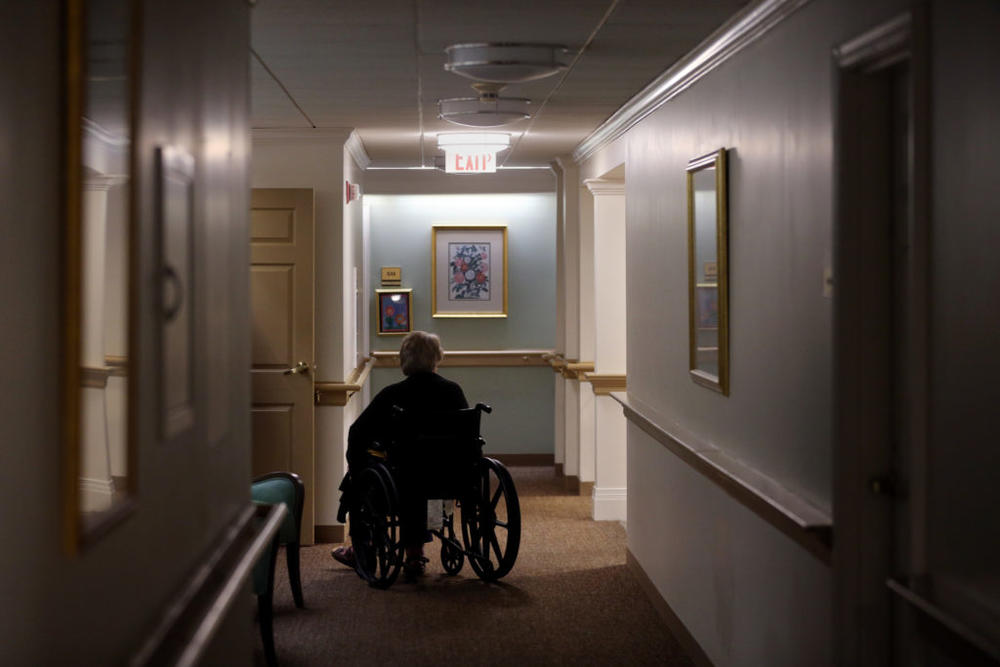
Caption
Only three of Georgia’s 357 nursing homes made the U.S. News & World Report highest-rated list in the publication's recent look at the industry nationwide.
Credit: File
LISTEN: Nursing homes in Georgia are underperforming those in other states when it comes to better patient care and health outcomes. GPB’s Ellen Eldridge has more on a new study from U.S. News and World Report.

Only three of Georgia’s 357 nursing homes made the U.S. News & World Report highest-rated list in the publication's recent look at the industry nationwide.
Georgia's short-term rehabilitation and long-term care facilities were ranked on a scale of one to five for several factors including staffing levels, patient outcomes, and whether steps to avoid harm and improve health were part of nursing home routines.
Only three of Georgia’s 357 nursing homes made the U.S. News & World Report highest-rated list.
The data used in the report come from Nursing Home Compare, a program run by the Centers for Medicare & Medicaid Services (CMS), which is the federal agency that sets and enforces standards for nursing homes.
There were 35 homes that ranked better than average in at least one of the two services evaluated, Ben Harder, the chief of health analysis and U.S. News managing editor, said.
"On the flip side, there are 120 nursing homes in Georgia that got a rating of one or two out of five," Harder said. "So there are many more that got less positive ratings than got these high performing ratings."
The report also looked at potential overuse of certain medications like antipsychotic drugs.
While it is legal for doctors to prescribe these medications for any reason they see fit, the concern when a nursing home has a very high rate of antipsychotic drug use is that some of those patients don't really need those drugs for medical reasons, and may be receiving them because they tend to make patients and residents more compliant, Harder said.
"Basically, some people refer to them as chemical straitjackets," he said. "And so if a patient is doped up on these drugs, they may be much easier to kind of manage because they may just sit all day in a chair in a wheelchair and not really give the staff a lot of trouble. But that's obviously not good quality of life or good quality of care for those residents."
U.S. News data found that at 22% of evaluated nursing homes, at least 1 in 4 residents received antipsychotic drugs. That number suggests excessive use of the medications.
Staffing shortages and a lack of skilled nursing care contributes to poor outcomes among patients and residents, which is why CMS wants to mandate a federal floor for staffing levels, according to a White House statement.
CMS says that even a 20-minute increase in staffing per resident day from a Registered Nurse was associated with 22% fewer cases of COVID-19 and 26% fewer COVID-related deaths in nursing homes.
But the problem in Georgia, as well as other states, is an existing workforce shortage.
During the pandemic, more than 200,000 nursing home residents and workers died — around one-fifth of all COVID deaths in the United States.
Staffing mandates just worsen an existing problem, said Chris Downing, president of the Georgia Health Care Association, a nonprofit association of skilled nursing centers, assisted living communities, and home and community-based case managers.
Downing noted the new rule would require the industry to hire another 4,000 nurses and nurse aides. Hiring that many people is impossible with the existing workforce shortage, he said.
"The nursing home industry, as you know, is still in what I would refer to as a COVID haze," he said. "We haven't fully come out of that. We lost roughly 6,000 employees here in Georgia alone, in our industry, through COVID. And we are not even close to, I guess, bringing those people back."
In more than 25 years of working in health care, Downing said he has never seen a shortage like we're seeing in this industry or across the health care spectrum. The organization's study found that the federal staffing mandate would mean Georgia nursing homes would need to hire an estimated 3,652 additional full-time employees (2,754 nurse aides and 898 Registered Nurses).
The U.S. News report helps people identify nursing homes that are providing a good care, getting good outcomes for patients and residents, and making sure that they have adequate staffing available, Harder said.
People can search for a nursing home by name, state, city or ZIP code and filter based on ratings, size and certain capabilities.
"If it's your mom or dad or loved one, you want that person to get the highest quality of care," Harder said. "And so by publishing all that information usnews.com and enabling patients, residents and their family members to access that data, we hope that they can make informed decisions about which nursing homes to have their loved ones cared for at."
Though the nursing homes in this report all accept Medicaid and Medicare patients, it can be more difficult to get a bed because, in general, CMS doesn't pay nursing homes as much as private insurance does.
"And so nursing homes, if they only have a limited number of beds, may preferentially make those beds available to patients with more generous insurance plans," Harder said.
Users should understand that all ratings, whether good or bad, are just a starting point for health care consumers who are choosing where to receive care, U.S. News & World Report said in its methodology statement, adding that in-depth visits, whether in-person or virtual give people a chance to ask questions, observe residents and their families and caregivers, and get a feel of a nursing home that ratings can't communicate.